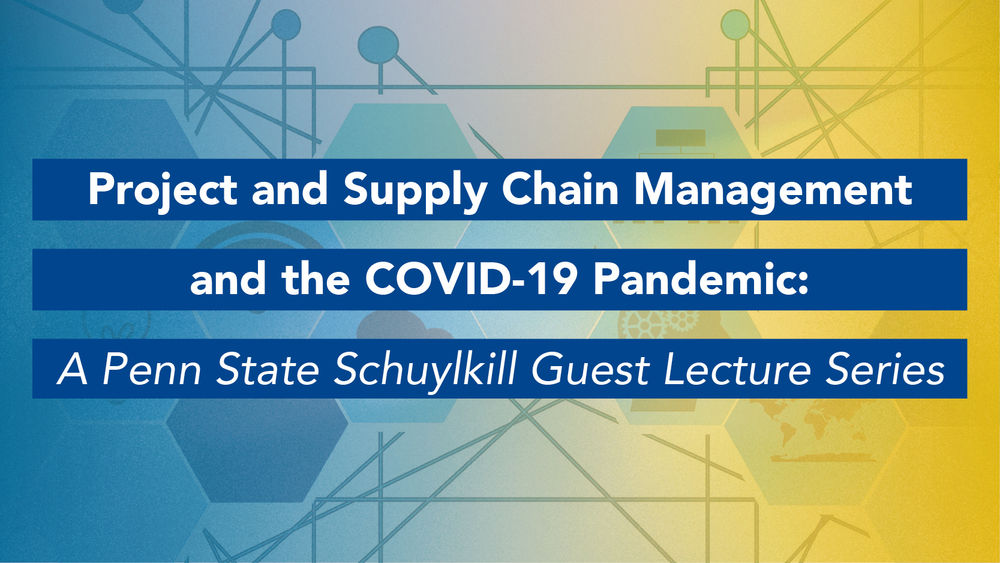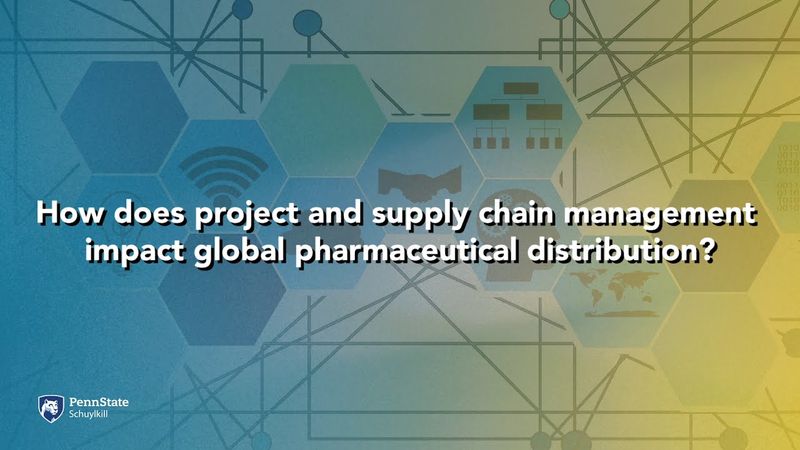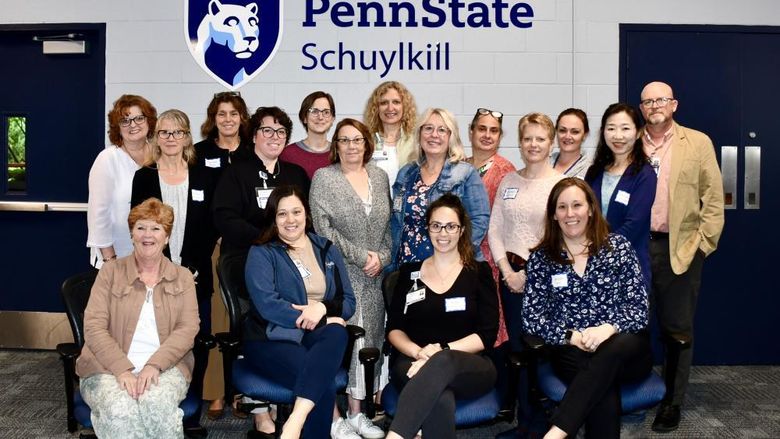
SCHUYLKILL HAVEN, Pa. — The COVID-19 pandemic has significantly impacted project and supply chain management across the globe, and Kathy Fabrizi, instructor and program coordinator of Penn State Schuylkill’s project and supply chain management program, recognized this shift as a critical teaching moment for Schuylkill students.
In December, Fabrizi organized a guest speaker series for Schuylkill students that explored the significant role of the project and supply chain management function in combatting COVID-19, both locally and globally. Speakers included professionals who work in pharmaceuticals, government, grocery distribution, and the military.
"The COVID-19 crisis has been a pivotal moment for project and supply chain management professionals,” Fabrizi said. “From the beginning of the pandemic when consumers struggled to find the household supplies they needed, to the present focus on vaccine distribution, project and supply chain management has been at the heart of the solution.”
Project management in big pharma during COVID-19
Presented by Nina Clarke-Walker, senior project director
Clarke-Walker has worked in pharmaceutical research for 19 years, and she currently serves as a senior project director for an internationally top-ranked clinical research organization. In her presentation, she shared how the COVID-19 pandemic has impacted new drug testing.
“If a patient is participating in clinical trials and receives their treatment every two weeks, how do we ensure the investigational product is getting to the patient if there's a lockdown and they can't get to the doctor's office to receive the drug?” she asked viewers. “If part of the trials include something like an EKG or other in-person monitoring, how can we do that when we’re physically distancing?”
Clarke-Walker sees the pharmaceutical industry shifting to a more virtual space as the pandemic continues. Collecting vital signs via wearable technology — Apple Watches and FitBits, for instance — is becoming as common as telehealth appointments, and with positive side effects. Recording patients’ vital signs through such devices allows for remote data collection while also helping to remove the anxiety some patients experience when visiting the doctor that may impact heart rate and blood pressure.
Establishing the first mass-testing site in Pennsylvania
Presented by Tom Garrity, deputy director, Montgomery County Department of Public Safety
Garrity serves as deputy director of the Montgomery County, Pennsylvania, Department of Public Safety. A former firefighter who retired from the Philadelphia Fire Department at the rank of deputy chief, Garrity has nearly three decades of experience working as an instructor at several local colleges, universities, and firefighter academies. This past spring, Garrity served as the one of two on-site project leads for Pennsylvania’s first COVID-19 mass test site, and in this presentation, he discussed project and supply chain management considerations for and impacts to public safety and pandemic response.
“Planning was critical to the success of this test site,” Garrity said. “We had to consider the testing site selection and layout, the equipment required to operate the site, and, perhaps most importantly, the registration software used to schedule appointments.”
The leadership from the various groups working at the site met several times each day, requiring an exceptional level of cooperation among varied skill sets. “While the national news showed lines of cars stretching for miles at other test sites, this was never the case in Montgomery County,” said Garrity. “The Department of Health and Human Services site felt that this site should be the example for others throughout the nation,” he concluded.
Walmart’s project management and supply chain during COVID-19
Presented by Andrew DiEugenio, general transportation manager, Walmart
DiEugenio serves as a general transportation manager at Walmart Fleet Office 7830 in Pottsville, Pennsylvania. Walmart’s supply chain is one of the largest in the world, and the Pottsville grocery distribution center is one of Walmart’s highest volume locations. During this presentation, DiEugenio discussed leadership and motivation as well as the project and supply chain considerations he makes at a time when successful grocery distribution has never been more crucial.
Typically, DiEugenio relies upon forecasting to inform staffing and transportation to tackle the distribution center’s massive volume of orders and processing. Comparing sales numbers year over year helps Walmart determine whether or not to stock and staff for a high-volume sales week. “But COVID-19 threw that to the wind,” he said. “People are coming in less frequently, but they’re ringing up larger tickets on their visits. These massive fluctuations throw the supply chain out of balance.” To manage this shift, the location increased its hiring efforts.
In finishing his presentation, DiEugenio reminded viewers that the most difficult — and most vital — aspect of supply chain management is successful time management and leading by example.
Pennsylvania National Guard operations and response during COVID-19
Presented by Colonel Frank Montgomery, director of domestic operations, Pennsylvania National Guard Joint Operations Center
Montgomery currently serves as the director of domestic operations for the Pennsylvania National Guard Joint Operations Center, where he is responsible for planning, resourcing, coordinating, and directing domestic support operations in support of local, state, and/or federal government during emergencies or disasters. Montgomery discussed project and supply chain considerations in his role and the impact of COVID-19 in operations and pandemic response.
In March 2020, Pennsylvania Governor Tom Wolf activated the Pennsylvania National Guard through an emergency declaration issued via PEMA, the Pennsylvania Emergency Management Agency. This declaration allowed the Guard to fill the gaps that Pennsylvania’s emergency management personnel could not, providing staff support in long-term care facilities and grocery stores, assisting vulnerable populations with PPE, and managing COVID mapping.
Many guard members helped manage the logistics of COVID testing sites and will play a role in vaccine distribution, as well. “We set up three community-based testing sites across the commonwealth,” said Montgomery. “In Montgomery County, we tested close to 18,000 people over a three-month period,” he explained, citing that specific test site as one of the busiest in the nation. And when hospitals reached their capacity in large metropolitan areas, the guard helped establish alternate care sites at the Glen Mills School and East Stroudsburg University in Delaware and Monroe counties, respectively.
Seeing project and supply chain management theory applied to real-life situations
The critical role of project and supply chain management within the COVID-19 pandemic stretches from consumer product delivery to testing efforts and government response, and the experts in this speaker series offered nuanced insight into the many moving parts that keep society functioning during unprecedented times.
To learn more about Penn State Schuylkill’s project and supply chain management degree, visit schuylkill.psu.edu/pscm.






